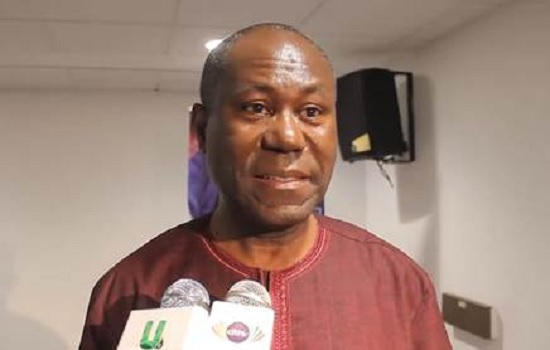Joseph Boahen Aidoo
The Ghana Cocoa Board (COCOBOD) has stated empathically that the cocoa road projects which are currently under construction across the country will be completed.
It, however, explained that new “Cocoa road projects” will not be initiated following the government’s ongoing engagement with the International Monetary Fund (IMF).
The clarification from COCOBOD follows some media publications that all cocoa road projects have been put on ice following an order from the International Monetary Fund.
According to information available to this paper, COCOBOD has no direct interactions with the IMF. The only active IMF programme is with the government, not COCOBOD.
The Cocoa Road Programme was initiated by COCOBOD to resolve transport issues pertaining to the delivery of agro-inputs to cocoa farmers and to facilitate cocoa bean evacuation.
Speaking to journalists at the 50th anniversary celebration symposium of the Cocoa Clinic, CEO of COCOBOD, Joseph Boahen Aidoo explained the essence of the cocoa roads was to allow residents in cocoa growing areas to have easy access to healthcare and other important social amenities to ensure rapid development.
“The EU sent a team last year to do due diligence on sustainable production and when they came, a member of the delegation wanted to know why COCOBOD has been involved in cocoa roads construction because it is not a core business of COCOBOD, and the said member of delegation insisted that we take that venture out of our equation; and, the IMF is also saying the same thing.
“They say that we can continue with what we are currently constructing and not start new ones,” Mr. Aidoo hinted.
In addition, he outlined plans for establishing healthcare centres in cocoa-growing communities to improve farmers’ access to medical care, citing instances of arduous travel for medical care as motivation.
“I have had the experience where a woman, who was in labour and couldn’t deliver in 2001 had to be carried in a hammock and travelled over 28 kilometers and couldn’t survive. And, when we look at the countryside to see how our cocoa farmers struggle to access health delivery, you will be touched to do something; and that is why, as an institution, it is important to bring health services and facilities as closer to these farmers.”
By Ebenezer K. Amponsah


